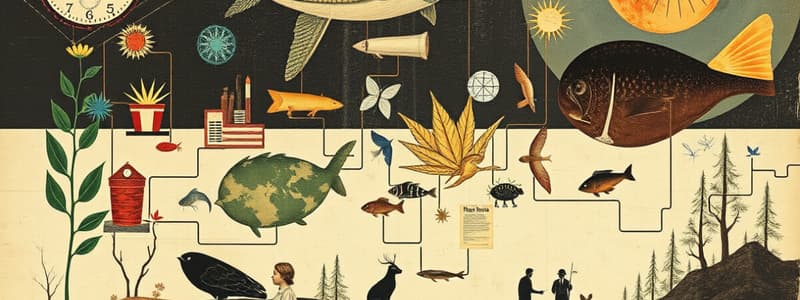Podcast
Questions and Answers
What is the primary source of energy for all animals?
What is the primary source of energy for all animals?
- Plants
- Other animals
- The sun (correct)
- Water
What term describes plants in the context of food chains?
What term describes plants in the context of food chains?
- Consumers
- Primary producers (correct)
- Decomposers
- Apex predators
Which of the following is an example of an apex predator?
Which of the following is an example of an apex predator?
- Blackbird
- Deer
- Hawk
- Frogfish (correct)
What is a key characteristic of apex predators?
What is a key characteristic of apex predators?
What do all animals in the food chain between primary producers and apex predators have in common?
What do all animals in the food chain between primary producers and apex predators have in common?
What is the role of food webs in ecosystems?
What is the role of food webs in ecosystems?
What is an error in understanding the food chain described?
What is an error in understanding the food chain described?
Why is it important to mention that frogfish can be apex predators despite being small?
Why is it important to mention that frogfish can be apex predators despite being small?
How is energy ultimately obtained by animals in a food chain?
How is energy ultimately obtained by animals in a food chain?
What is the relationship between prey and predator in a food chain?
What is the relationship between prey and predator in a food chain?
Flashcards are hidden until you start studying
Study Notes
Food Chains
- Energy transfer in ecosystems is initiated by the sun and reaches Earth for plant use through photosynthesis.
- Plants, known as primary producers, occupy the base of food chains; they convert sunlight into energy stored within their structure.
- The term "primary" indicates that these producers are the first step in energy production for the food chain.
Apex Predators
- Apex predators top food chains and have no natural predators; examples include lions and great white sharks.
- Human hunting is distinct from natural predation and does not classify an animal as having natural predators.
- Some apex predators, like the frogfish, may be smaller and less intimidating; frogfish primarily eat other frogfish.
Role of Secondary Consumers
- Animals between primary producers and apex predators are classified as both predators and prey.
- For instance, blackbirds consume small insects but are preyed upon by birds of prey like hawks.
- Most animals in food chains have varied diets, consuming multiple prey types and being consumed by various predators.
Food Webs
- The complexity of predator-prey relationships leads to the concept of food webs, offering a more accurate depiction compared to simple food chains.
- Food webs are crucial for maintaining the ecological balance of ecosystems worldwide.
- Energy flow in ecosystems is fundamentally rooted in the conversion of solar energy into a usable form for living organisms.
Studying That Suits You
Use AI to generate personalized quizzes and flashcards to suit your learning preferences.




